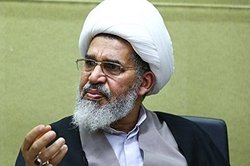 The deputy secretary-general of Bahrain’s Islamic Action Society said that Ayatollah Khamenei’s religious authority had played an important role in the emergence of a new Islamic civilization after the demise of Imam Khomeyni.
The deputy secretary-general of Bahrain’s Islamic Action Society said that Ayatollah Khamenei’s religious authority had played an important role in the emergence of a new Islamic civilization after the demise of Imam Khomeyni. RNA – In an exclusive interview with Rasa News Agency, Hujjat al-Islam Abdullah Ibrahim Saleh, the deputy secretary-general of Bahrain’s Islamic Action Society and a professor in the Islamic Seminaries, referred to the death anniversary of Imam Khomeyni, the founder of Iran’s Islamic Revolution, and said, “The school of thought of Imam Khomeyni is based on standing up against oppression in the world, the abandonment of religious differences, and the unity of the Islamic ummah.”
The Bahraini scholar stated that Imam Khomeyni placed great emphasis on confronting the oppressors and arrogant powers of the world and added, “Such arrogant countries are always seeking to exploit the people and plunder national wealth. Therefore, he confronted the most oppressive country in the world, the United States, and supported the oppressed, especially the Palestinian people.”
Hujjat al-Islam Saleh added, “The religious authorities (sources of emulation), which were crystallized in the person of Imam Khomeyni and his successor, Ayatollah Khamenei, played an influential role in the emergence of the modern Islamic civilization. Imam Khomeyni is the key to liberation from the bondage of oppression and the oppressors, and he delineated the path of the struggle against the arrogant.”
It is worth mentioning that Imam Khomeyni, the founder of the Islamic Revolution of Iran, was born on the 20th of Jamadi al-Thani 1320 AH, (September 24, 1902) in the city of Khomeyn in Markazi Province in a family of scholars, emigrants and jihad and joined the supreme kingdom on June 3, 1989.
Rasa News Agency
112/979